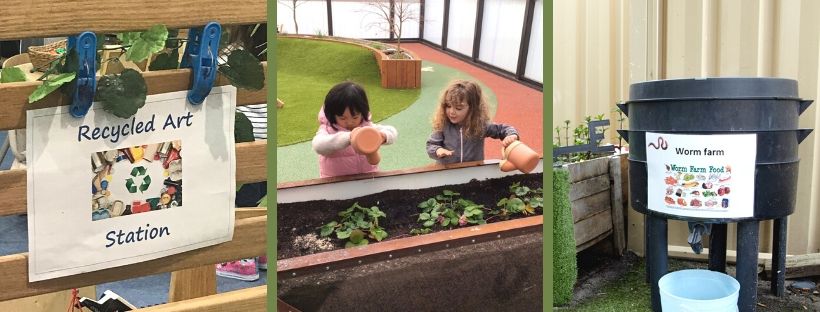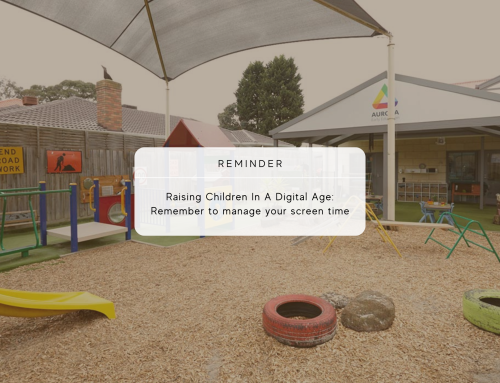World Environment Day is held on June 5 every year. It’s a day that celebrates the importance of our environment and explores ways that we can each protect it. This year, the theme of World Environment Day is biodiversity; the United Nations is aiming to raise awareness about the stunning biodiversity on Earth. We at Aurora Early Education observed 13 principal steps towards sustainability in early childhood on this behalf.
Aurora recognises that in order to protect our world’s biodiversity and environment as a whole, it is important to promote sustainability. We approach sustainability in two ways; in our operations and in our curriculum. Aurora has a dedicated Sustainability Policy, which marks our commitment to improving all areas of our operations to make them more sustainable and environmentally friendly.
At the same time, while programming, our educators find way to incorporate discussions and experiences that are centered around sustainability. Educators also actively look for ways to use sustainable resources in experiences and children’s learning environment. Thorough intentionally thinking about sustainability in our programs, we are able to continuously have discussions about sustainability with our children, enhancing their knowledge and their connection to the environment.
Visit us at Aurora Rowville Center.
Sustainability in Early Childhood Within Our Operations
As a childcare center, we must lead by example and highlight the measures we are taking to better our environment. This is to ensure that our children and the early childhood community at large consider the well-being of the environment and absorb sustainable practices into their daily routine.
At Aurora, we have a number of measures in place to limit our wastage and utilize everything we have available to us to its maximum potential. And to make sure we do our part and continuously make room for improvement, our sustainability officer reviews Aurora’s sustainability policy and practices.
Get connected with us.
1. Reusing rainwater
Rainy days bring the opportunity to harvest the rainwater and use it for watering plants and in our flushing system.
2. Reusable cleaning cloths
Instead of increasing our general waste, for certain surfaces, we use reusable cleaning cloths ensuring we are deeply sanitizing them after each use.
3. Recycling materials to make new learning resources
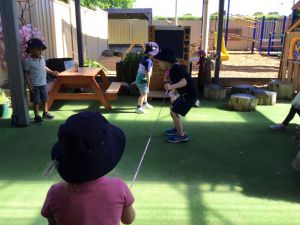
For instance, teachers collected rubber bands from vegetable packaging and used them to make a jump rope for the Kinder to use during their outdoor playtime.
4. Collecting bread tags
Did you know that bread tags often end up in landfills, and are extremely dangerous for wildlife? At Aurora, we have set up a bread tag collection point, where parents can bring in their bread tags. Once we have gathered a collection, we send them to be recycled into wheelchairs!
Take a tour of Aurora Early Education Doncaster.
5. Repurposing food scraps
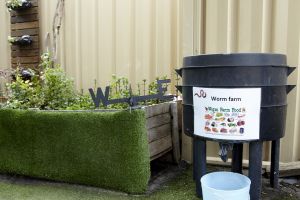
Our food scraps are taken outdoors to our worm farm! Worms feed on them and use them their energy contribute generously to the health of soil, making it better and easier to grow plants and crops.
6. Reduced energy consumption
Our lights automatically sensor movement and only come on when there is activity in a room to save power consumption.
7. Craft bins
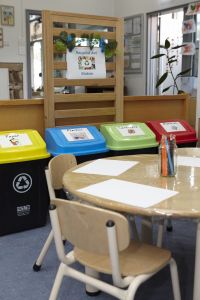
Bins are placed in our centers for families to donate cardboard and other reusable materials that can be utilized in arts and crafts activities.
Educating Children for Sustainibility
Being environmentally friendly is not always instinctual for many individuals, it is something that needs to be developed and learnt. Knowledge and habits of sustainability can be built at a young age. It is important that in our teaching methods, we lay a solid foundation about sustainability and its benefits to the earth.
Have a look at our services.
8. Planting herbs
At our centers, we get the children involved in planting herbs in our bush tucker garden. It helps them gain an understanding of growing new green life and how treating them as well as using them helps the environment. These experiences of working with nature at Aurora also aid their understanding of biodiversity and its worth.
9. Maintaining a garden
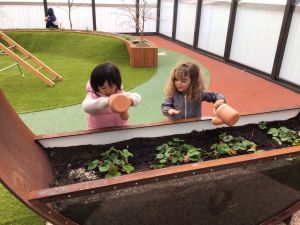
With the rainwater we collect, we also use it to water plants, encouraging our children to care for the garden and nature. This allows them to be more conscious about reusing resources and their value to the earth.
Take a tour of Aurora Early education QV.
10. Teaching the recycling system
Along with saving water, our children also learn about saving paper and the system of recycling. After our sustainability learning and practices, the children were able to collaboratively figure out what materials belong in the different bins, deeming our methods successful.
11. Repairing broken things
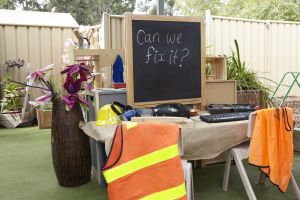
We also teach our kids that many things can be amended if they are broken. Just like a doctor fixes a patient’s aches, we can try fixing lots of broken things to make them as good as new instead of throwing them away and buying more.
12. Recycled art station
Creating art is so important to us and our children. We have a recycled art station at Aurora, which allows for art creation in a sustainable way. Resources like popsicle sticks and scrap paper are recycled to be used as art materials.
13. Enriched experiences
As part of our curriculum, Aurora delivers experiences for the children’s enhanced comprehension of sustainability. For instance, last year our Kinder children visited Science Works and participated in proper waste management activities.
In Education for Sustainability in Early Childhood, Sue Elliot and Julie Davisn suggest that teaching sustainability to children is characterized by a set of principles. These principles can be identified as holistic, experiential, critically reflective, collaborative, problem-based, systemic, and participatory. Aurora educators keep these principles in mind while designing and conducting programs. In doing this, we ensure that our children continue to build on their knowledge of sustainability.
We will continue to explore ways we can make our operations, and programs we deliver eve more sustainable and in doing so, hope to role model sustainability to our ever observant children. By being sustainable, we continue to protect and advocate for our environment, ensuring that future generations continue to enjoy the beautiful world we are privileged to live in.


